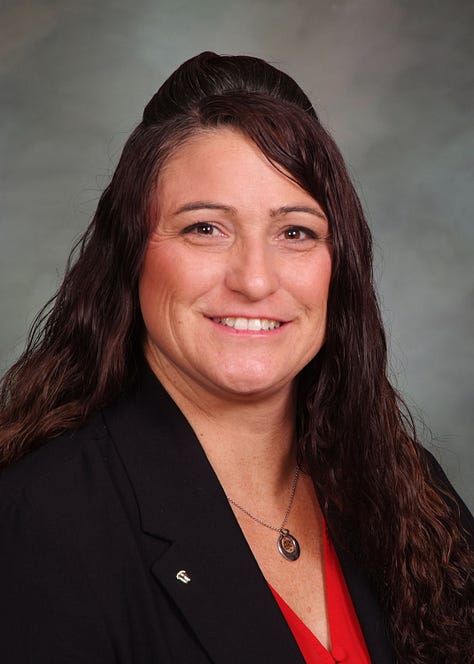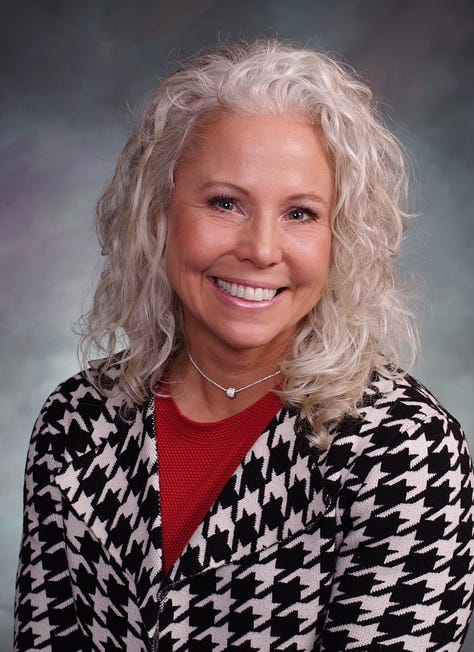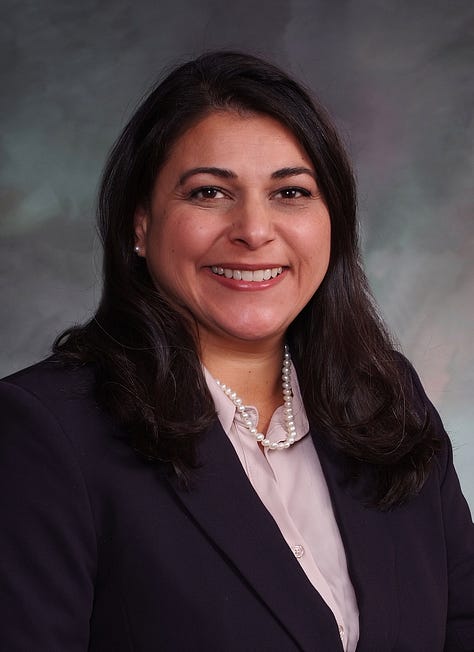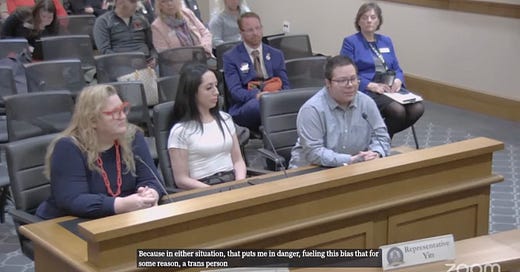House committee advances anti-trans What Is A Woman Act
Transgender individuals are more likely than their cisgender peers to experience violence in a restroom. But lawmakers claimed trans people, or those posing as such, constitute a threat to women.
The House Labor Committee voted 7-1 to advance the first of several anti-transgender bills filed by lawmakers ahead of the 2025 General Session, which kicked off Tuesday.
The What Is A Woman Act defines sex and gender as one and the same — in defiance of every leading medical and psychological authority, including the National Institutes of Health. The bill would enable the state and its agencies or subdivisions, such as cities and counties, to “recognize or enforce distinctions between the sexes” when it comes to sports, prisons, crisis centers, locker rooms and restrooms.
Casper Rep. Jayme Lien (HD-38), the bill’s main sponsor, defended the proposed legislation in comments to the House Labor Committee today.
“Many people think that this is about the LGBTQAI+ community, and it is not,” she said. “This protects everyone. As you see, the most intense person that can harm a child is a perpetrator that has not been caught in the past. And if you have the ability, under the guise of this community, to enter a restroom as a trans individual, that puts a lot of people at risk.”
Despite Lien’s claim that the bill is not about the queer community, every comment that followed, both for and against the bill, demonstrated that wasn’t true.
Cutting first to testimony in favor of the bill, the committee heard from Rich Guggenheim, a representative of the national anti-transgender organization Gays Against Groomers. The group “directs online harassment and intimidation campaigns targeting LGBTQ+ people and events including drag shows, hospitals and libraries,” according to the Southern Poverty Law Center, which designated GAG as a hate group.
“The transgender agenda is fundamentally homophobic, misogynist and harmful to the freedom and liberties of all of us,” he said. “Gender ideology and queer theory seeks to compel our speech and strip women of their right to consent and say no to men in their bathrooms, locker rooms, on their fields and courts and in their prisons … Our rights as gay and lesbians are predicated upon the same rights of women, because our rights are sex-based.”
Jeanette Ward, a former lawmaker from who lost her seat during the 2024 primary election, also spoke in favor of the bill — which was identical to an unsuccessful bill she herself filed ahead of last year’s session.



Ward made an appeal to an allegedly eternal scientific truth and to her religious belief in the devil.
“I am proud of Rep. Lien for carrying this bill forward, which simply defines male and female as society and science has understood these terms forever, until about five minutes ago,” Ward said. “Those on the left want to erase boundaries that have existed from the beginning of creation. The Creator created them, male and female. The evil one has always tried to erase the creator’s boundaries from the distinctions between borders, countries, good and evil, men and women. Woe to those who call evil good and good evil, who put darkness for light and light for darkness.”
The committee also heard from those opposed to the bill.
Sara Burlingame is the executive director of Wyoming Equality, the state’s main LGBTQ+ advocacy organization. She argued the bill was an affront to the individual liberty so many Wyomingites profess to love.
“There are unintended consequences,” Burlingame said. “Namely, no one has addressed: how would this be carried out? Who will the state hire to check the genitals of children and adults? Who will they compel to see a doctor that they don’t want to see? And do we as Wyoming citizens believe that that is the role of the state? Do we want to use state money to compel someone to do something that they don’t want to do with their own bodies?”
Beside Burlingame at the testimony table were Santi Murillo, a transgender woman, and Greyson Hill, a transgender man. They said they had been using, respectively, female and male restrooms in Wyoming for years without challenge or controversy.
“If I may ask the men on committee and the men in this room: would you feel comfortable with me in a restroom?” Murillo asked. “If we’re going based on biological sex — which I’ll never deny, I’m a trans woman — would you be comfortable with me in a restroom? For the past four years, I have been in this beautiful building with you all, using the women’s restroom, no problem, with no issue whatsoever.”
But that doesn’t make it a non-issue, Murillo added, saying she would not feel comfortable using the men’s.
“If I am to use the men’s restrooms, men’s locker rooms, that puts me in a level of danger,” she said. “There’s discussions that it doesn’t affect the LGBT community, but when you talk about the trans individuals that it will affect — it does affect us.”

Transgender and nonbinary individuals are far more likely to experience violence than cisgender people and there’s evidence that trans and nonbinary youth are more likely to be the victims of sexual assault when their bathroom access is restricted.
There is little evidence to support the claim that transgender people pose a threat to others in public restrooms, despite several studies examining the issue.
Hill asked the lawmakers a question mirroring Murillo’s.
“If I go into the women’s restroom, how comfortable would you be for me to be in there with you?” he asked. “I’ve been transitioning for a little over five years now, and if I walk into a women’s restroom, I am pegged as a man. That makes women uncomfortable. I never intend to make women uncomfortable, so I use the men’s restroom. I have used the men’s restroom in this building multiple times, and I’ve never had an issue.”
But, like many trans people, Hill said he has experienced discrimination.
“The only people who have ever hurt me in a public bathroom were cis-identifying people — that is, people who identify with their biological sex — and I've been harmed in both men's and women’s restrooms,” he said. “I also work here in Wyoming. If this continues, and goes past state buildings, what am I supposed to do at work for eight hours a day if I can’t use the men’s restrooms without either making women uncomfortable or breaking the law?”
The committee did not debate the issue, but the lawmakers did approve an amendment altering the definition of “male” and “female.” That amendment was handed to lawmakers before the hearing and is not yet available on the legislature’s website.
The final vote was 7-1 with Jackson Rep. Mike Yin (HD-16) casting the sole dissenting vote. Cheyenne Rep. Clarence Styvar (HD-12) was excused.





Thanks for the excellent reporting, Jeff.
Too bad they don’t spend equal amount of energy on improving access to health care in Wyoming and working to reduce suicide rates and helping real access to broadband- the list is long and they are hyper -focused on the U.S./them